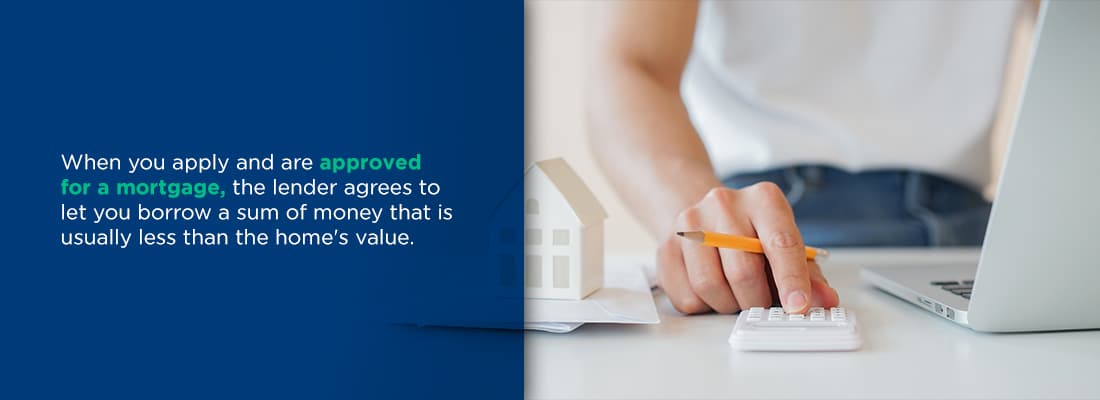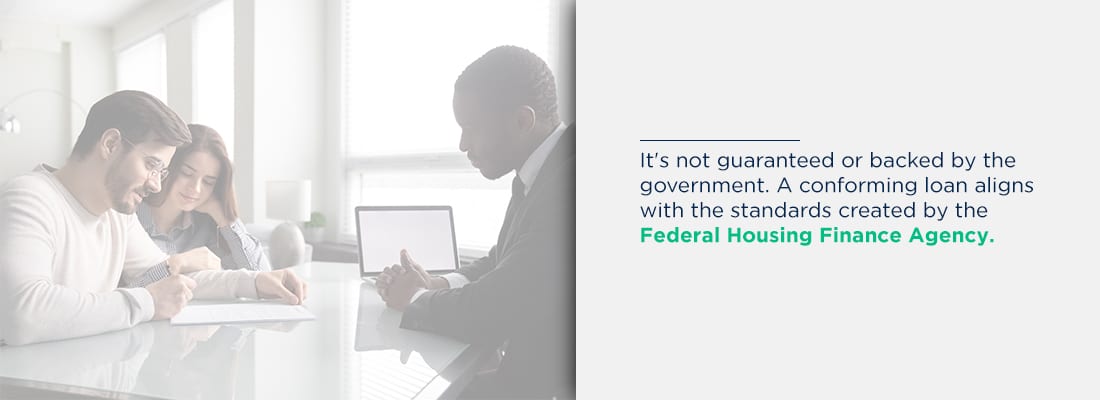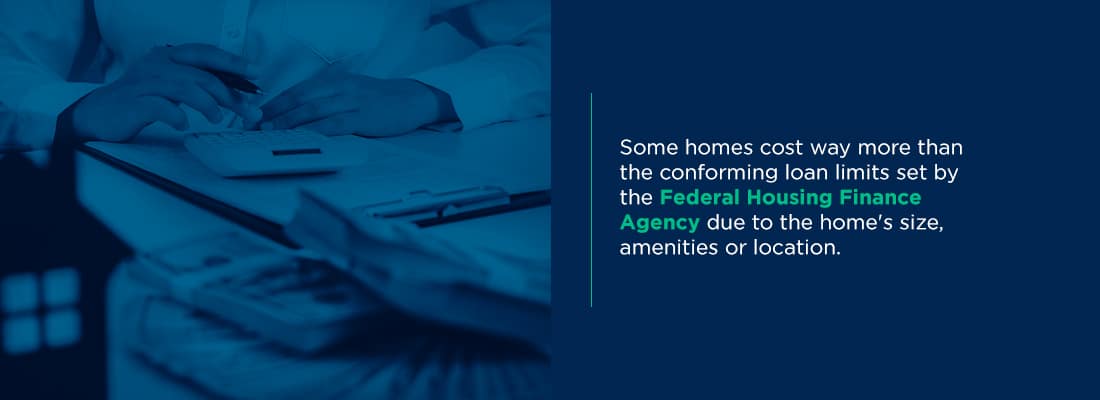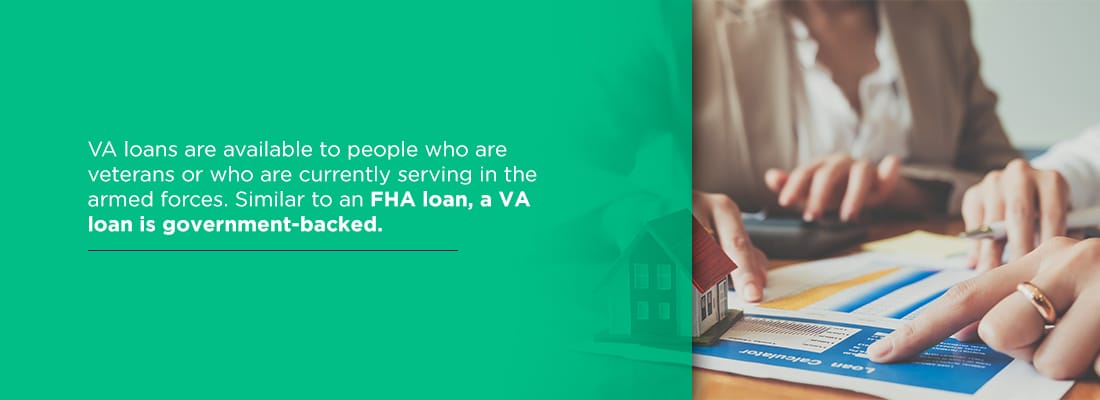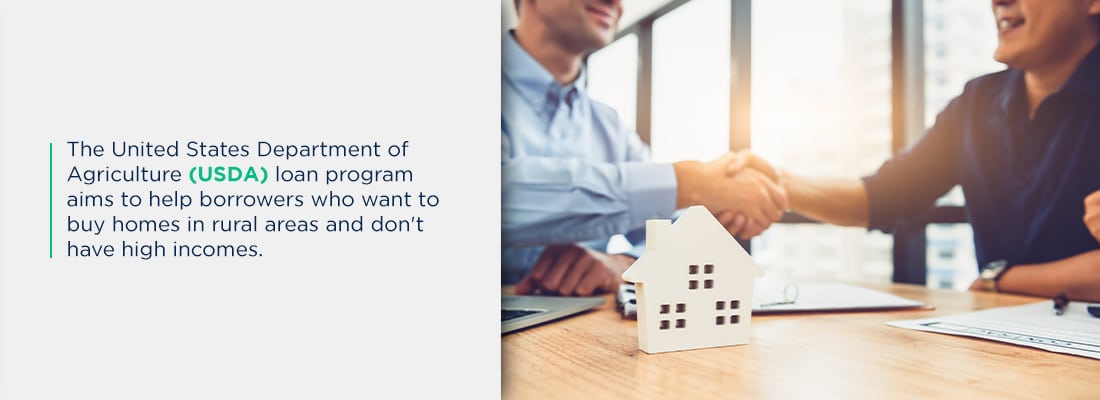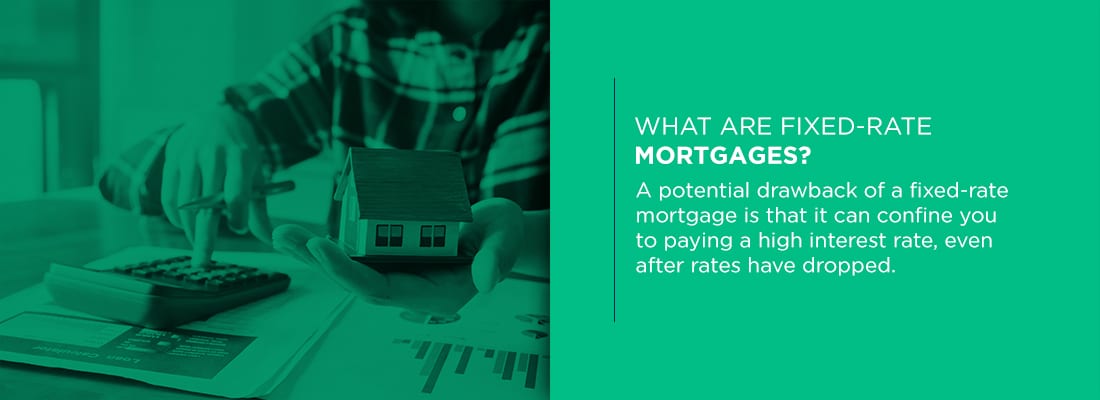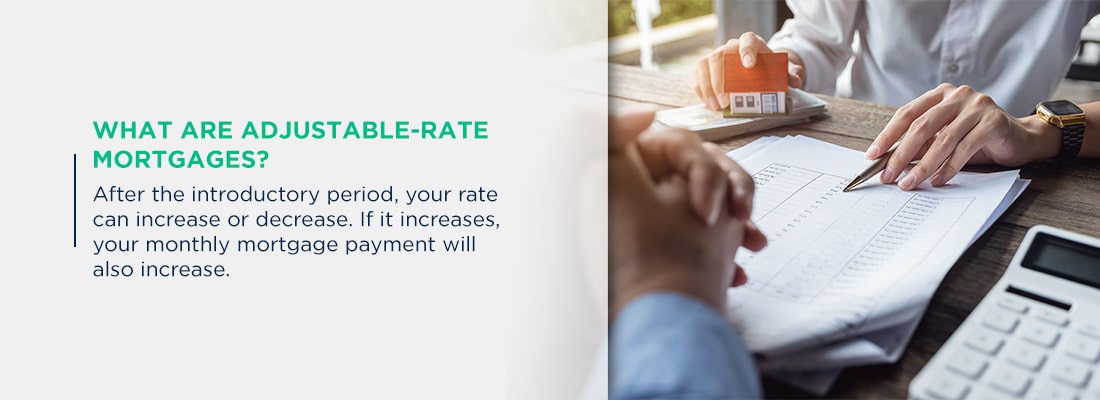Many homebuyers make a list of the things they’d like in their new home — including the number of bedrooms, the types of amenities and the size of the yard, to name a few. When shopping for a home, it’s just as important to make a list of things you’d like from your mortgage — including the length of the loan, the interest rate and the repayment terms.
You have lots of options when choosing a mortgage. Some home loans are designed for people who meet specific criteria, and others for people who might not qualify for another type of loan. Take a look at some of the different types of mortgages available and what they offer to find the best mortgage for you.
Table of Contents
- What is a Mortgage?
- What Mortgage Do I Need?
- Fixed-Rate Mortgages
- Adjustable-Rate Mortgages
- Other Mortgage Options
- Programs to Help You Get a Mortgage
- Apply with Assurance Financial Today
What Is a Mortgage?
A mortgage is a type of loan you acquire to purchase a home. When you apply and are approved for a mortgage, the lender agrees to let you borrow a sum of money that is usually less than the home’s value. You need to repay the mortgage according to the terms of the loan. Most mortgages require you to make monthly payments of principal, interest and other fees, such as private mortgage insurance (PMI).
When you have a mortgage, the home acts as collateral. If you stop making payments and don’t work something out with the lender, they can foreclose on the home. Since the home is collateral, many mortgages have lower interest rates than unsecured loans, such as personal loans or credit cards.
When choosing a mortgage, there are several things to pay attention to:
- The length of the loan term:30 years is a popular mortgage term, but 10, 15 and 20-year mortgages are also available.
- The size of the interest rate: The market influences your interest rate, as does your credit score, income and loan size.
- The type of interest rate: Your rate can be fixed, meaning it will stay the same throughout the life of the loan or adjustable.
- The type of fees, such as PMI, lender’s fees and other fees: You’ll most likely need to pay an assortment of closing costs and may need to pay fees such as PMI premiums each month.
- The loan size:The amount you borrow depends on the size of your down payment, the cost of the house and what you can afford.
What Mortgage Do I Need? The Best Type of Mortgage to Get
How do you know which mortgage is right for you? It helps to consider your financial stability, your employment situation and your credit history. Two broad categories of mortgages exist, private loans and government-backed loans. Private loans often have stricter requirements, while government-backed loans are guaranteed by various federal agencies or departments and have looser requirements.
Your lender will let you know which mortgages you qualify for and help guide you to the one that best meets your needs. Get to know some of the most common mortgage options:
1. Conventional Conforming
A private lender makes a conventional mortgage. It’s not guaranteed or backed by the government. A conforming loan aligns with the standards created by the Federal Housing Finance Agency. One of those standards is a loan limit for all loans that Freddie Mac and Fannie Mae purchase. As of 2021, the limit for a conforming loan is $548,250* for a single-family home. The limit in areas with a high cost of living and higher-than-average housing prices is $822,375*.
You need to meet stricter requirements to qualify for a conventional loan. One of the requirements is a higher credit score. While you might get approved for a conventional loan with a score around 620, to get the best possible terms, including the lowest possible interest rate, it’s better to have a score in the mid-700s or higher.
The down payment requirements for a conventional loan are typically different than for other mortgage types. The standard advice is to put down at least 20% to get a conventional mortgage. But your lender might be willing to approve you if you have a smaller down payment. If you put down 5% or 10%, you can expect to pay PMI premiums in addition to your monthly principal and interest payments. How long you need to pay for insurance depends on how long it takes you to pay off at least 20% of the home’s value.
Once the loan-to-value ratio is 80% or less, you can ask the lender to remove the PMI premiums. The lender should automatically cancel your PMI premiums when the loan-to-value ratio falls to 78%.
A conventional conforming mortgage offers you a fair amount of flexibility. You can choose the mortgage term and the type of interest rate, such as fixed or adjustable. Some conventional loan programs even allow you to put down just 3% of the home’s value, making homeownership potentially more attainable and affordable.
Are you eligible for a conventional loan? Review these requirements to determine whether you qualify for this mortgage loan type and whether it’s right for you:
- Your credit score is above average. A higher score can potentially result in a lower interest rate, especially for those with a score over 740.
- You have a reasonable or low debt-to-income ratio. The ratio of your financial obligations to your monthly income should not exceed 43%.
- You have saved up enough for a down payment between 3% and 20%. Keep in mind that with a smaller down payment, you will most likely need to buy private mortgage insurance.
2. Conventional Non-Conforming
Some homes cost way more than the conforming loan limits set by the Federal Housing Finance Agency due to the home’s size, amenities or location. You can still get a mortgage for an expensive home, but the type of mortgage you get will be slightly different from a conventional conforming loan.
Conventional non-conforming mortgages are also called jumbo loans due to their size. As a general rule, lenders consider jumbo loans to be riskier than conforming loans. The borrower is borrowing more from the lender, so there is a slightly higher risk of default. For that reason, jumbo loans traditionally have slightly higher interest rates than conforming loans. They also usually have stricter eligibility and down payment requirements.
For example, while you might get a conventional conforming loan with as little as 3% down, you can expect to put down at least 20% to get a jumbo loan. You also need a higher credit score to qualify for a jumbo loan. Usually, the minimum score a lender will consider is 700. The higher your score, the more likely you are to get approved and potentially get a lower interest rate.
A lender will also carefully consider your debt-to-income ratio before approving you for a jumbo loan. The more existing debt you have, the less likely you are to get approved for the loan. There is a limit to jumbo loans. Usually, the maximum amount you can borrow to buy a single-family home is around $1 million.
Are you eligible for a jumbo loan? Review these requirements to determine whether you qualify for this mortgage loan type and if it’s right for you:
- Your credit score is above average.
- You have a debt-to-income ratio below 36%.
- You have saved up a hefty down payment, at least 20% of the home’s price.
- You need to buy a home that costs more than the conforming loan limit.
[download_section]
3. FHA
Government-sponsored mortgage programs aim to help people who might have difficulty qualifying for conventional loans purchase a home. The first type of government-backed mortgage is an FHA loan. The FHA loan program dates back to 1934. The government created it to ease credit requirements, allow for smaller down payments and reduce closing costs, making it possible for people to buy their first homes.
Usually, FHA loans allow borrowers to put down between 3.5% and 10% of the home’s value. How much you need to put down depends on your credit score. FHA loans allow borrowers to have slightly lower credit scores than conventional mortgages. To get an FHA loan with a 3.5% down payment, your score must be at least 580. If your score is at least 500, you’ll need to put down 10%.
Although FHA loans are government-backed, the mortgages themselves don’t come from the government. Instead, private lenders issue them with the understanding that the government will step in and cover the cost if the borrower defaults or stops making payments on the loan. The government guarantee protects the lender from losing too much money on a potentially risky loan.
In exchange for the government’s backing, you need to pay mortgage insurance if you decide to take out an FHA loan. FHA mortgage insurance is slightly different from the PMI premiums you pay on a conventional mortgage. First, the mortgage insurance is for the entire term of the loan if your down payment is under 10%. Unless you refinance an FHA loan to a conventional loan at some point, you’ll be responsible for premiums from the first payment until the last. You’ll also have to pay a mortgage insurance premium upfront, along with a monthly premium.
FHA loans can have terms of 15 or 30 years. The interest rate is fixed, meaning it stays the same throughout the entire term. An FHA loan might be a good option if you’re having trouble qualifying for a conventional loan due to a lower credit score or lower income.
Are you eligible for an FHA loan? Review these requirements to determine whether you qualify for this mortgage loan type and whether it’s right for you:
- You have a FICO credit score in the range of 500 to 579 with a down payment of at least 10%.
- You have a FICO credit score of at least 580 with a down payment of at least 3.5%.
- You’ve been employed for the past two years.
- You can verify your income with pay stubs, bank statements and tax returns.
- Your FHA loan will be used for your primary residence.
- Your property is appraised and meets property guidelines.
- Your monthly mortgage payments won’t be more than 31% of your monthly income. Some lenders may allow up to 40%.
4. VA
VA loans are available to people who are veterans or who are currently serving in the armed forces. Similar to an FHA loan, a VA loan is government-backed. In this case, Veterans Affairs guarantees the mortgages, which private lenders issue.
VA loans have two distinct advantages over conventional and FHA loans. The first advantage is that they don’t require a down payment. They are one of the few types of mortgages available that allow for 100% financing. Unlike conventional or FHA loans, you don’t have to pay mortgage insurance premiums on a VA loan, even if you put down 0% upfront.
VA loans also offer reduced closing costs. If you take out a VA loan, you need to pay the VA funding fee, which ranges from 1.4% to 3.6%, depending on the size of the down payment and whether you’re buying your first home or not. Other closing costs can be negotiated with the seller, meaning you might be able to get the seller to agree to pay for a portion of the costs.
Since VA loans come from private lenders, the lender might have its own requirements when deciding who to approve for the mortgage. A lender can determine what credit score you need, for example. It might also have certain income requirements.
If you’re a current or former member of the U.S. armed forces, a VA loan might offer the best value for you when buying a home. Spouses and widows of former or current service members can also qualify for VA loans.
Are you eligible for a VA loan? Review these requirements to determine whether you qualify for this mortgage loan type and whether it’s right for you. You may qualify for a VA loan if:
- For 90 consecutive days, you served in active service during a time of war.
- For 181 days, you served in active service during a time of peace.
- For 6 years, you have been an active member of the Reserves or National Guard.
- You are the spouse of a service member who died during active service or from a disability related to their service.
5. USDA
The United States Department of Agriculture (USDA) loan program aims to help borrowers who want to buy homes in rural areas and don’t have high incomes. Like FHA and VA loans, USDA loans are guaranteed by the government — in this case, the USDA. Private lenders issue the mortgages.
To qualify for a USDA loan, you need to meet several requirements. Your income can’t be higher than 115% of the median household income in the area. The home you want to buy needs to be in a rural area or a qualifying part of a suburb. Homes in cities or metropolitan areas don’t qualify for USDA loans.
Since one of the USDA mortgage program goals is to provide housing to people with the greatest need, it’s usually a loan program worth considering if you don’t qualify for other types of mortgages and want to live in a rural area. Though the loan program targets people with low to moderate incomes, you still need to prove a steady income, such as at least two years of stable employment, to qualify. You can get a USDA loan with a lower credit score, but you are likely to get a better interest rate and terms with a score of at least 640.
Like a VA loan, you can get a USDA loan with as little as 0% down. To further assist you with the homebuying process, USDA loans allow sellers to contribute to your closing costs.
Are you eligible for a USDA loan? Review these requirements to determine whether you qualify for this mortgage loan type and whether it’s right for you:
- You have a relatively low income in your area. You can check the USDA’s page on income eligibility to determine whether you qualify.
- You’ll be making the home your primary residence, or for a repair loan, you occupy the home.
- You must be able to verify that you’re able and willing to meet the credit obligations.
- You must either be a U.S. citizen or meet the eligibility requirements for a noncitizen.
- You must be purchasing a property in an eligible area.
What Are Fixed-Rate Mortgages?
An additional thing to consider when choosing the right home loan is the type of interest rate the loan has. A variety of factors influence the rate a lender offers you, including your credit score, income and the loan size.
Another factor that comes into play is whether the rate is fixed or adjustable. A fixed-rate mortgage has an interest rate that stays the same throughout the term of the loan. One advantage of a fixed-rate mortgage is that it lets you lock in a low interest rate, provided rates are on the low end when you buy the home.
A potential drawback of a fixed-rate mortgage is that it can confine you to paying a high interest rate, even after rates have dropped. If you’d like to lower your interest at some point due to a drop in interest rates overall or an improvement in your credit score, you’d need to refinance, taking out an entirely new mortgage.
A mortgage with a fixed rate might be right for you if you plan on staying in your home for the long term and rates are low when you apply for the loan and buy the house. With a fixed-rate loan, you have some reassurance that your principal and interest payment will stay the same throughout the loan term, allowing you to create a steady budget and have a good idea of what to expect when it comes to your housing costs.
What Are Adjustable-Rate Mortgages?
The interest rates on an adjustable-rate mortgage (ARM) fluctuate throughout the life of the loan. Often, ARMs offer an introductory rate that stays the same for several years. For example, you might get a 5/1 ARM, which has a five-year introductory period. After the first five years, the rate changes based on what’s going on in the market.
After the introductory period, your rate can increase or decrease. If it increases, your monthly mortgage payment will also increase. If it drops, your monthly payment will also drop. When the introductory period is over, the interest rate will adjust based on a set schedule. In the case of a 5/1 ARM, the rate adjusts every year.
ARMs often have a rate cap, which keeps the interest rate from increasing too much and helps you avoid a monthly payment beyond your reach. The cap can be on each adjustment, as well as a lifetime cap on interest increases. For example, your ARM might have an adjustment cap of 2% and a lifetime cap of 5%.
One feature that makes ARMs appealing is a low interest rate when you take out the mortgage. The rate you’re offered on an ARM will often be lower than the rate on a fixed-rate mortgage. For that reason, it can make sense to choose an ARM over a fixed-rate loan if you’re not planning on staying in the home for the long run. If you anticipate selling before the end of the introductory period, you can enjoy several years of reduced interest.
Another potential benefit of an ARM is that your rate could fall even more in the future. If you feel that interest rates will keep falling, getting an ARM can help you take advantage of lower rates without the need to refinance your mortgage.
It’s important to note that adjustable rates aren’t offered on all types of mortgages. You can choose a conventional mortgage, FHA loan or VA loan with an adjustable rate.
Other Mortgage Options
In addition to conventional mortgages and government-backed loans, there are several other home loan options for borrowers who might be in unique situations. If you already own a home, it’s possible to get another mortgage on the property, for example. You can also get a loan to build your home.
1. Construction Loan
This type of mortgage loan involves buying land on which to build a house. These loans typically come with much shorter terms than other loans, at a maximum term of one year. Rather than the borrower receiving the loan all at once, the lender will pay out the money as the work on the home construction progresses. Rates are also higher for this mortgage loan type than for others.
There are two types of construction loans:
- Construction-to-permanent: A construction-to-permanent loan is essentially a two-in-one mortgage loan. This is also known as a combination loan, which is a loan for two separate mortgages given to a borrower from a single lender. The construction loan is for the building of the home, and once the construction is completed, the loan is then converted to a permanent mortgage with a 15-year or 30-year term. During the construction phase, the borrower will pay only the interest of the loan. This is known as an interest-only mortgage. During the permanent mortgage, the borrower will pay both principal and interest at a fixed or variable rate. This is when payments increase significantly.
- Construction-only: A construction-only loan is taken out only for the construction of the house, and the borrower takes out another mortgage loan when they move in. This may be a great option for those who already have a home, but are planning to sell it after moving into the home they’re building. However, borrowers will also pay more in fees with two separate loans and risk running the chance of not being able to move into their new home if their financial situation worsens and they can no longer qualify for that second mortgage.
2. Second Mortgage
Second mortgages are taken out after a borrower’s first mortgage and are generally used for financing home improvements, consolidating debt or for covering enough of the first mortgage to avoid the requirement of paying the mortgage insurance. Second mortgages generally have terms that last only up to 20 years and can be as short as one year.
Programs to Help You Get a Mortgage
If you’re buying your first home, several programs exist that help simplify the process or make homeownership more affordable. First-time homebuyers programs are usually available on a state or local level. Some offer grants to help you afford a down payment, while others might help with closing costs or other fees.
Another thing to consider if you’re about to buy your first home is working with a financial counselor. A counselor can help you make a plan for saving for a down payment or help you work on improving your credit so you’ll get the best mortgage terms possible, whether you qualify for a conventional loan or a government-sponsored one.
One thing worth noting is that specific mortgage types aren’t limited to first-time buyers. You might qualify for a USDA or VA loan if you’re buying your second or third home, provided you plan on using the home as your primary residence. The same is true of FHA loans. While the loan programs expect you to live in the home as a condition of qualifying for the mortgage, they don’t require you to be a first-timer.
Another option is the Good Neighbor Next Door Program. It is sponsored by the U.S. Department of Housing and Urban Development and assists law enforcement, firefighters, teachers and emergency medical technicians with housing. The program offers a 50% discount on a home’s listed price in locations deemed “revitalization areas.” To be eligible, you must commit to living in the home for at least 36 months.
Your mortgage lender is also happy to discuss the different types of home loans available. They can work with you to help you choose a mortgage that works best with your current financial situation and that will help you achieve your goals in the future.
Apply for a Mortgage With Assurance Financial Today
Buying a home starts with getting the right mortgage. Assurance Financial has home loan options for every type of buyer, from first-time homebuyers to more experienced buyers. If you’re a veteran, we can help you get a VA loan. If you’re likely to buy in a rural area, we can help you with a USDA loan. Start your application today, or reach out to find a loan officer near you.
Linked Sources:
- https://singlefamily.fanniemae.com/originating-underwriting/loan-limits
- https://www.consumerfinance.gov/ask-cfpb/when-can-i-remove-private-mortgage-insurance-pmi-from-my-loan-en-202/
- https://assurancemortgage.com/jumbo-loans/
- https://www.hud.gov/buying/loans
- https://assurancemortgage.com/fha-loans/
- https://assurancemortgage.com/va-loans/
- https://www.va.gov/housing-assistance/home-loans/funding-fee-and-closing-costs/
- https://www.rd.usda.gov/programs-services/single-family-housing-guaranteed-loan-program
- https://assurancemortgage.com/apply/
- https://assurancemortgage.com/find-a-loan-officer/
- https://www.hud.gov/program_offices/housing/sfh/reo/goodn/gnndabot
- https://assurancemortgage.com/usda-loans/
- https://eligibility.sc.egov.usda.gov/eligibility/incomeEligibilityAction.do?pageAction=state


